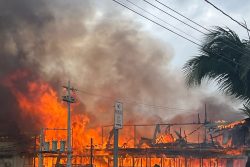In 18 months Guyana may have its rice certified by the Fair Trade Organization (FTO), which should see farmers getting higher prices among other advantages, EU contracted International Fair Trade Expert Graham Young says.

Young explained that at the request of the Caribbean Rice Association, a study into the scope for a Fair Trade Certification label for rice exports from Guyana and Suriname was commissioned by the EU. As a result, the Fair Trade project, which is being funded through the European Development Fund by the EU, was developed.
Guyana and Suriname, a report generated by the Fair Trade team said, are the largest exporters of rice within the African, Caribbean and Pacific (ACP) Group of States. Rice accounts for the jobs of approximately 150,000 workers in each country and the liberalization of the EU market means that both countries will face increased competition for their rice exports.
The project, Young said, aims to enhance awareness about Fair Trade labelling standards and to make recommendations regarding certification standards to support the development of labelling rice exports.
Young, the project’s team leader, and Phillip Angier, a Social Auditing and Social Finance Expert, explained the benefits of Fair Trade labelling to farmers and various rice officials yesterday. This was done during a seminar at the Ministry of Agriculture.
It was explained that the project is designed to engage interested stakeholders—growers, farmers, millers and exporters, among others. Initial visits by the team were done in May, stakeholder consultations held in June and earlier July, after which validation seminars, like yesterday’s exercise, are being held.
The findings of the study, carried out by the Fair Trade team, were presented to those at the seminar. One miller noted that it would be extremely important to ensure that everyone in the industry fully understood what it entails.
Fair Trade certification means that those who make the commitment will see to it that workers and farmers are paid fairly. It also promotes education and the development of more sustainable trade ties with other nations. Fair Trade certification involves voluntary cooperation with a certifying organization and usually reflects an international effort between companies and their suppliers.
To be Fair Trade certified, Young explained, a company must guarantee that their suppliers do not use child or slave labour, that workers are paid a fair living wage, that employment opportunities are available to all workers and that everyone has an equal opportunity for advancement, and that healthy working and living conditions are provided for workers. In addition, producers must agree to support the educational and technical needs of their workforce, while promoting active and healthy trade agreements and being open to public accountability. It also encourages environmentally sustainable production and harvest practices.
It was decided during the seminar yesterday that the Guyana Rice Producers’ Association (GRPA) would deal with the FTO application process. Meanwhile, the Guyana Rice Development Board, Angier pointed out, is providing research support.
Reducing Poverty
In 2000 the Fair Trade Labelling Organizations (FLO), which governs Fair Trade certification, took the first steps towards introducing FTO standards for rice production. The aim, Young and Angier explained, was to open up new markets for the benefit of small farmers.
Since the introduction of these standards, they said, farmers who sell rice with the Fair Trade label receive a price that covers their cost of sustainable development. These farmers also get a Fair Trade Premium to invest in social, economic and environmental community projects.
The Fair Trade premium or Social Premium as it is also called will be paid by those who agree to the FTO terms.
A body will be elected locally to deal with the FTO issues and will deal with depositing the money into a bank account.
It was stressed that the funds will be used to subsidize prices during periods when they are low and those involved will choose community projects in which they see fit to invest. These may include a community library or a drying floor for farmers.
For each new product category and each new producing area, Angier explained, a FTO minimum price and premium is set by the FLO. This is done after extensive research and consultations. Currently, there is no existing price for rice from Guyana and Suriname, Angier said.
He further explained that the FLO sets its own priorities as to what products or geographies to research, on the basis of the needs of the market and the producers involved. However, rice from Guyana and Suriname is not one of the FLO’s identified priorities. The two experts said they are currently “in negotiation with the Labelling Initiative in the UK (The Fairetrade Foundation) to see if they will oversee the research undertaken through this project and use it as a basis for a price application from them to FLO”.
However, they stressed that the overall aim is to ensure that small producers participate in Fair Trade and provide them with opportunities which will ensure that they are able to engage in commercial activities which will contribute to the reduction of poverty and an increase in development.
Are we ready?
General Secretary of the GRPA Dharamkumar Seeraj, who spoke with Stabroek News after the seminar, said he believes that Guyana is ready for FTO certification. The conditions for certification which must be met, Seeraj said, already exist here and have been for years. Over the years, the GRPA General Secretary said, they have taken measures to ensure that child labour was not encouraged in the industry and that environmentally friendly practices were used. “Many of the core conditions which the FTO needs,” Seeraj insisted, “already exists here…we are ready.”
He urged that farmers countrywide participate in the ongoing sensitization sessions so that they will become aware of and fully understand what they stand to benefit from becoming FTO certified.
Seeraj said that the social premium is perhaps one of the more desirable advantages which the FTO set-up has to offer. He further insisted that very small farmers—those who farm from 2 to 15 acres—are being targeted. “Our aim here,” he said, “is to ensure that the vulnerable farmers can and will benefit.”








